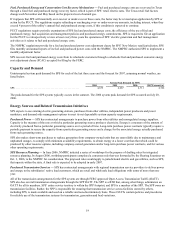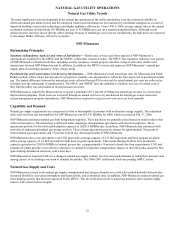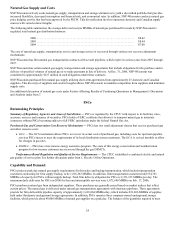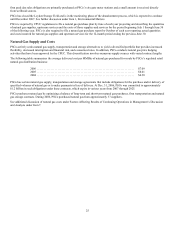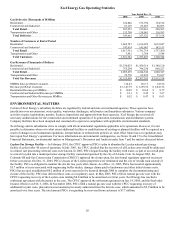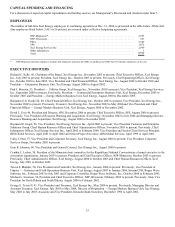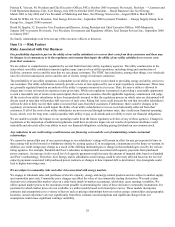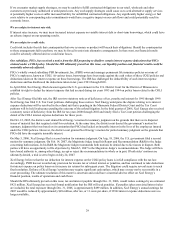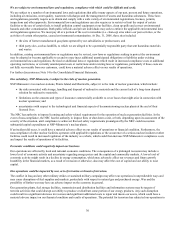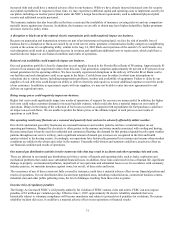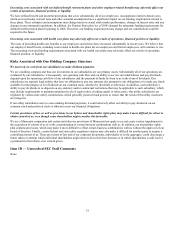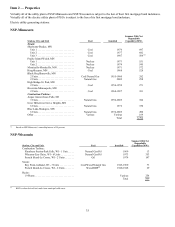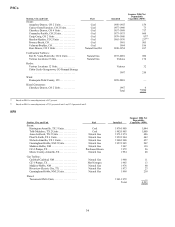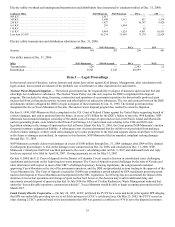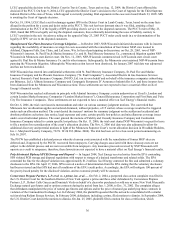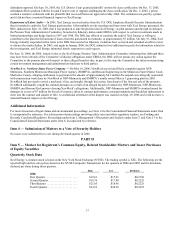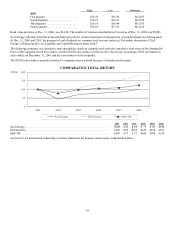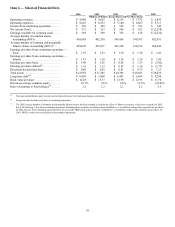Xcel Energy 2006 Annual Report Download - page 39
Download and view the complete annual report
Please find page 39 of the 2006 Xcel Energy annual report below. You can navigate through the pages in the report by either clicking on the pages listed below, or by using the keyword search tool below to find specific information within the annual report.29
If we encounter market supply shortages, we may be unable to fulfill contractual obligations to our retail, wholesale and other
customers at previously authorized or anticipated costs. Any such supply shortages could cause us to seek alternative supply services
at potentially higher costs or suffer increased liability for unfulfilled contractual obligations. Any significantly higher energy or fuel
costs relative to corresponding sales commitments would have a negative impact on our cash flows and could potentially result in
economic losses.
We are subject to interest rate risk.
If interest rates increase, we may incur increased interest expense on variable interest debt or short-term borrowings, which could have
an adverse impact on our operating results.
We are subject to credit risks.
Credit risk includes the risk that counterparties that owe us money or product will breach their obligations. Should the counterparties
to these arrangements fail to perform, we may be forced to enter into alternative arrangements. In that event, our financial results
could be adversely affected and we could incur losses.
Our subsidiary, PSCo, has received a notice from the IRS proposing to disallow certain interest expense deductions that PSCo
claimed under a COLI policy. Should the IRS ultimately prevail on this issue, our liquidity position and financial results could be
materially adversely affected.
PSCo’s wholly owned subsidiary PSR Investments, Inc. (PSRI) owns and manages permanent life insurance policies on some of
PSCo’s employees, known as COLI. At various times, borrowings have been made against the cash values of these COLI policies and
deductions taken on the interest expense on these borrowings. The IRS has challenged the deductibility of such interest expense
deductions and has disallowed the deductions taken in tax years 1993 through 2003.
In April 2004, Xcel Energy filed a lawsuit against the U.S. government in the U.S. District Court for the District of Minnesota to
establish its right to deduct the interest expense that had accrued during tax years 1993 and 1994 on policy loans related to the COLI
policies.
After Xcel Energy filed this suit, the IRS sent two statutory notices of deficiency of tax, penalty and interest for 1995 through 1999.
Xcel Energy has filed U.S. Tax Court petitions challenging those notices. Xcel Energy anticipates the dispute relating to its interest
expense deductions will be resolved in the refund suit that is pending in the Minnesota Federal District Court and the Tax Court
petitions will be held in abeyance pending the outcome of the refund litigation. In the third quarter of 2006, Xcel Energy also received
a statutory notice of deficiency from the IRS for tax years 2000 through 2002 and timely filed a Tax Court petition challenging the
denial of the COLI interest expense deductions for those years.
On Oct. 12, 2005, the district court denied Xcel Energy’s motion for summary judgment on the grounds that there were disputed
issues of material fact that required a trial for resolution. At the same time, the district court denied the government’s motion for
summary judgment that was based on its contention that PSCo had lacked an insurable interest in the lives of the employees insured
under the COLI policies. However, the district court granted Xcel Energy’s motion for partial summary judgment on the grounds that
PSCo did have the requisite insurable interest.
On May 5, 2006, Xcel Energy filed a second motion for summary judgment. On Aug. 18, 2006, the U.S. government filed a second
motion for summary judgment. On Feb. 14, 2007, the Magistrate Judge issued his Report and Recommendation (R&R) to the Judge
concerning both motions. In his R&R the Magistrate Judge recommends both motions be denied due to fact issues in dispute. Both
parties will have an opportunity to file objections by March 5, 2007 to the Magistrate Judge’s recommendations. The Judge will then
have broad authority to, among other things, accept or reject the recommendations in whole or in part. If both sides’ motions are
ultimately denied, a trial is set to begin on July 24, 2007.
Xcel Energy believes that the tax deduction for interest expense on the COLI policy loans is in full compliance with the tax law.
Accordingly, PSRI has not recorded any provision for income tax or related interest or penalties, and has continued to take deductions
for interest expense on policy loans on its income tax returns for subsequent years. The litigation could require several years to reach
final resolution. Defense of Xcel Energy’s position may require significant cash outlays, which may or may not be recoverable in a
court proceeding. The ultimate resolution of this matter is uncertain and could have a material adverse effect on Xcel Energy’s
financial position, results of operations and cash flows.
Should the IRS ultimately prevail on this issue, tax and interest payable through Dec. 31, 2006, would reduce earnings by an estimated
$421 million. Xcel Energy has received formal notification that the IRS will seek penalties. If penalties (plus associated interest) also
are included, the total exposure through Dec. 31, 2006, is approximately $499 million. In addition, Xcel Energy’s annual earnings for
2007 would be reduced by approximately $49 million, after tax, or 11 cents per share, if COLI interest expense deductions were no
longer available.


